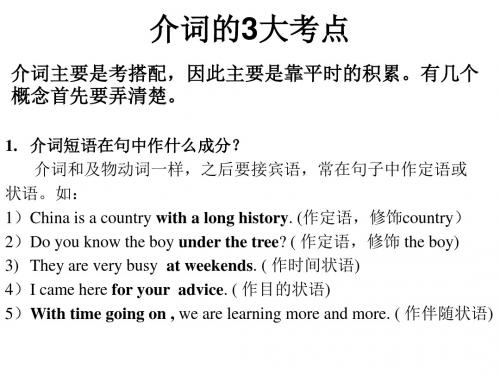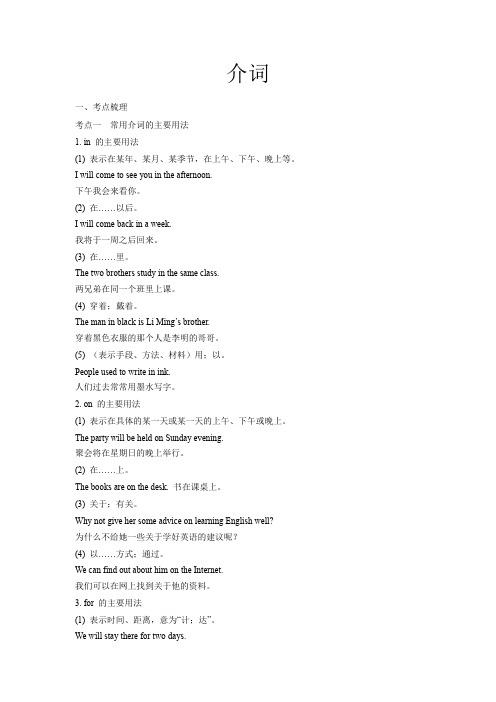介词的考点归纳
- 格式:docx
- 大小:33.15 KB
- 文档页数:14

介词总结以及易错点(1)一、单项选择介词1. He was offered a position at the local church school, he went to the Cambridge.A. after whenB. since whichC. after whichD. since when【答案】C【解析】【详解】考查介词+关系代词形式定语从句。
句意:他被授予了一个在当地教堂的职务,在这件事后他便去了剑桥。
后文发生在“He was offered a position at the local church school”之后,故用after, 指代前句整件事,应用关系代词which, 故选C。
2. We charge parcels weight, rather than individual units.A. in honor ofB. in contact withC. in terms ofD. in connection with 【答案】 C【解析】【详解】考查介词短语。
句意:我们根据包裹的重量,而不是包裹的件数收费。
A.in honor of为了对. …表示敬意; B.in contact with与. .有联系,接触; C.in terms of根据,在. …方面; D. in connection with 与..有关,有联系。
表示根据什么计费。
故选C。
【点睛】rather than 是一个并列连词。
用法如下:与would 连用时,构成“would rather…than.”句式,意思是“宁愿…而不愿…”,表示主观愿望,即在两者之中选择一个。
不与would 连用时,表示客观事实,意为“是…而不是. ;与其.不如…”,它连接的并列成分可以是名词、代词、形容词、介词(短语)、动名词、分句、不定式、动词等。
3.As is known to all, the law requires equal treatment for all, race, religion, or gender.A. in spite ofB.in terms ofC. regardless ofD. in virtue of【答案】C【解析】【详解】考查介词短语辨析。


高考英语语法专题复习介词考点汇总介词不能单独使用,必须后跟宾语,构成介词短语在句中使用,介词短语由介词+宾语构成,在句中可作状语、定语和表语等。
in, on, to, with, by, for, at, from, up, beyond, before, among, of, off, against, like, since, besides, behind, during等aboutbe about to …即将做……What/How about …?……怎么样for交换:He sold the house for 50,000 yuan.达到某一数值:She wrote a check for £20.赞成,拥护:I’m for getting up early and going to bed early.固定搭配:for one thing首先for example例如for ever永远for the time being 暂时,目前for instance 例如for free免费for the first time 第一次for sale出售,待售watch out for警惕long for 渴望for one’s good为(某人)好with和……一起::He is playing table tennis with Tom.用……工具:Don’t write with a pencil.随着:The weather changes with seasons.带有,具有:Our company needs people with specialized knowledge.行为方式:Handle with care!原因:She shivered with cold.注意:with的复合结构:常在句中作状语,表示伴随动作、行为方式及原因、条件或结果等情况。
She often sleeps with the window open. (adj.)她经常开着窗户睡觉。

英语高考介词高频考点英语高考介词是一个重要的考点,以下是一些高频考点:1. on/off 介词短语on/off 介词短语常用来考查,例如:- I can"t turn the TV off. (我无法关闭电视。
)- The power went off. (电源关闭了。
)2. in/out 介词短语in/out 介词短语也常用来考查,例如:- He came in late. (他迟到了很久。
)- The door is out of order. (门出了故障。
)3. under/over 介词短语under/over 介词短语也常用来考查,例如:- I can"t find my book under the bed. (我无法在床上找到我的书。
)- The cat fell over the fence. (猫掉进了篱笆里。
)4. among/amongst 介词短语among/amongst 介词短语也常用来考查,例如:- He laughed among the others. (他与其他人一样嘲笑了。
) - There are many books among the bookshelves. (书架上有许多书。
)5. between/among 介词短语between/among 介词短语也常用来考查,例如:- I can"t find my keys between the sofa and the wall. (我无法在沙发和墙上找到我的钥匙。
)- The children played happily among the flowers. (孩子们在花丛中玩得很开心。
)这些介词短语在英语高考中常常会出现,考生需要熟练掌握它们的含义和用法,以便在考试中更好地应对。

介词一、考点梳理考点一常用介词的主要用法1. in 的主要用法(1) 表示在某年、某月、某季节,在上午、下午、晚上等。
I will come to see you in the afternoon.下午我会来看你。
(2) 在……以后。
I will come back in a week.我将于一周之后回来。
(3) 在……里。
The two brothers study in the same class.两兄弟在同一个班里上课。
(4) 穿着;戴着。
The man in black is Li Ming’s brother.穿着黑色衣服的那个人是李明的哥哥。
(5) (表示手段、方法、材料)用;以。
People used to write in ink.人们过去常常用墨水写字。
2. on 的主要用法(1) 表示在具体的某一天或某一天的上午、下午或晚上。
The party will be held on Sunday evening.聚会将在星期日的晚上举行。
(2) 在……上。
The books are on the desk. 书在课桌上。
(3) 关于;有关。
Why not give her some advice on learning English well?为什么不给她一些关于学好英语的建议呢?(4) 以……方式;通过。
We can find out about him on the Internet.我们可以在网上找到关于他的资料。
3. for 的主要用法(1) 表示时间、距离,意为“计;达”。
We will stay there for two days.我们将在那里逗留两天。
(2) 表示“当作;作为”。
I’d like some bread and milk for breakfast.我想要些面包和牛奶当早餐。
(3) 表示理由或原因,意为“因为;由于”。
The match is cancelled for the heavy rain.比赛因大雨而取消。

中考英语-介词-超全考点梳理+易错点拨一、表示时间的介词1. in,on,at,overat用于表示时刻、时间的某一点at lunch在午饭时at breakfast早餐时at noon正午时at night在夜间at that time那时at the moment此刻,目前at the same time同时at times偶尔,有时at nine在九点钟at first开始的时候,起初at last最后►We usually have lunch at noon/ at twelve. 我们通常中午吃午饭(十二点吃午饭)。
注意:表示时间的名词前有this, last, next, every等修饰时,其前面不加介词。
this morning今天早上last Monday上周一every week每周on用于表示某天,某一天的上、下午(指具体的某一时,一律用on)on Monday 在周一on Monday evening 在周一晚上on Tuesday morning 在周二早上on June 6在6月6日on May 4,2016 在2016年5月4日on a cold night在一个寒冷的夜晚on that day在那天on Christmas Day在圣诞节那天on time准时on the night of July(the)first 在七月一日的夜晚►We didn’t listen to the lecture on Wednesday afternoon. 周三下午我们没去听演讲。
in用于表示周、月、季节、年和泛指的上午、下午、晚上(指在一段时间内)。
in the week在这周in the holiday在假期中in May 在五月in 1995在1995年in summer在夏季in Spring在春季in autumn在秋季in winter在冬季in September, 1995 在1995年9月in the morning 在上午in the afternoon 在下午in the evening在晚上in the 21st century在二十一世纪in time及时in an hour一个小时后in a minute一会儿,立刻►The plane took off on time.飞机准时起飞了。
中考介词归纳总结在中考中,介词是一个非常重要且常考的语法知识点。
介词在句子中起连接作用,表达时间、地点、方式、原因等关系。
掌握介词用法对于理解和运用英语至关重要。
本文将对中考所涵盖的常见介词进行归纳总结。
一、时间介词1. on:表示某一天或某一天的上午、下午、晚上等特定时间。
例:I will have a meeting on Monday.2. at:表示具体的时间点或特定的时刻。
例:We will meet at 9 o'clock.3. in:表示某一年、月、季节、时间段等。
例:She was born in 2005.例:We usually go swimming in summer.4. during:表示在某一段时间内。
例:He read a book during his summer vacation.二、地点介词1. at:表示具体的地点。
例:She is waiting for you at the bus station.2. on:表示表面或某物之上。
例:There is a book on the table.3. in:表示在某个范围、区域、国家或大洲内。
例:We live in a small town.4. to:表示朝向、方向。
例:He went to the library.三、方式介词1. by:表示通过某种交通方式或手段。
例:I usually go to school by bus.2. with:表示伴随、陪同。
例:She walks to school with her friends.3. in:表示用某种方式或手段。
例:He communicated with her in English.四、原因介词1. for:表示目的、原因或理由。
例:He went to the store for some milk.2. because of:表示因为。
中考初中英语考点详解:介词1.介词的分类及功能介词是一种用来表示词与词、词与句之间关系的词。
介词是虚词,一般不重读,不在句子中单独作成分,需要和它后面的词共同充当句子成分。
一介词的分类1根据介词的构成分类根据介词的构成形式,可将介词分为简单介词、合成介词、双重介词、短语介词四类。
(1)简单介词简单介词指的是由一个单词构成的介词。
Both my parents were born in 1970.我的父母都出生于1970年。
Whom are you taking the mobile phone to? 你要把这部手机带给谁?(2)合成介词合成介词指的是由两个词合在一起构成的介词。
He traveled throughout Europe in his twenties.在二十多岁时,他游历了整个欧洲。
I couldn’t see his face—he had his back towards me. (表示方向)我看不见他的脸——他背对着我。
(3)双重介词双重介词指的是由两个介词组成的介词。
I can take up to four people in my car.我的小汽车最多能坐4个人。
The moon finally appeared from behind the clouds.月亮终于从云后露了出来。
(4)短语介词短语介词由一个或几个简单介词和一个或几个其他词类组合构成,其作用只相当于一个介词。
Except for a broken bed,the room is empty.除了一张破旧的床,这个房间是空的。
Who are the boy and the girl in front of you?你前面的男孩和女孩是谁?提示短语介词是一个相当于简单介词的短语,不能单独使用,其后需加宾语。
而介词短语是由介词后加宾语构成,可以单独作句子成分。
2根据介词的意义分类根据介词的意义,可将介词分为表示时间的介词、表示空间(地点)的介词、表示原因(目的)的介词、表示让步的介词、表示方式(手段)的介词和其他介词。
介词的考点归纳:(重点记忆一些方位介词、时间介词、方式介词及一些介词短语)介词是一种虚词,它不能单独担任句子成分,必须与名词或代词或相当于名词的其他词类、短语或从句构成介词短语,才能担任句子成分。
一、介词的种类和介词短语的用法1.介词的种类介词由词形上可分为简单介词和短语介词。
简单介词知识一个单词,如:in,on,after等。
短语介词是由两个以上单词集合而成,如:out of,in front of,because of,instead of 等。
2.介词短语的用法①作定语介词短语作定语时,一律后置。
The book on the desk in mine.桌子上的书是我的。
He bought a house of five rooms.他买了一所有五个房间的房子。
A gentleman in white came into the hall.一个身穿白衣的绅士走进了大厅。
②作状语介词短语作状语时,修饰动词、形容词、副词或者整个句子。
Classes begin at eight.(修饰动词)八点钟开始上课。
Jane looks young for her age.(修饰形容词)珍妮看起来比她的实际年龄年轻。
The school is not far from my house.(修饰形容词)学校离我家不远。
To my surprise, Li Ming passed the exam at all.(修饰全句)使我吃惊的是,明居然考试及格了。
③作表语He is in danger.他处于危险之中。
We are against/for you.我们反对/支持你。
It was because of the heavy rain, we couldn’t go out.因为这场大雨,我们出不去了。
④作宾语补足语Make yourself at home.放松一些,就和在你自己家一样。
We made him out of danger.我们使他脱离了危险。
二.表示时间的介词表示年、月、日、时刻等用at,in,on表示时间的前后用in,before,after表示期限等用by,until,till表示期间等用for,during,through表示时间的起点等用from,since表示时间的经过等用in,within1.at、in、on用在时间上的区别:A. at + 钟点/时间点/时间某一时刻(at 9:00, at lunch, at breakfast, at noon, at night, at that time, at the moment)B. in + 某年/某月/某年某月/某个季节/某个世纪/泛指的早上/下午/晚上in the morningin the afternoonin the eveningin the 21st centuryin September ; in Mayin1995in the holidayin summerC. on + 日期/星期/具体的某一天/ 具体的某一天的上午、下午、晚上on Mondayon Tuesday morningon May 4thon a cold nighton a sunny morningon the night of July(the)first在七月一日的夜晚注意:表示时间的名词前有this,last,next,every等修饰时,其前面不加介词。
this morning今天早上;last Monday上周一;every week每周巩固练习:选择用at、in、on填空:1._______ 10:40 2.________ 20053.________ June 3, 2014 4._________ the afternoon5.________May, 2012 6.________ winter7.________ Friday 8._______ the 21st century9._______ a hot summer night 10. _________Saturday morning2.in、after、before用在时间上的区别:A. in 在……后in与将来时态连用时,表示“过多长时间以后”的意思,后面跟表示一段时间的词语。
He will be back in two months.B. after在……后After与过去时态连用时,后面才能跟表示一段时间的词语。
After与将来时态连用时,后面只能跟表示时间点的词语。
He will arrive after four o’clock.He returned after a month.She went to Nanjing last May,and she came back after a month.C. before 在……前Wash your hands before dinner.巩固练习:选择用in、after填空:1.Her father came back from France ________ two years.2.My parents went to Shanghai yesterday and they will return to Guangzhou ________ three days.3. by,until/till 区别A. by 在…前(时间);截止(到)….How many English books had you read by the end of last year? 到去年年底以前你看过多少本英文书?She had left by the time I arrived.我到时(之前)她已经走了。
例:by the end of在……底(之前) by then 到那时 by the time+从句在……之前B. until/till直到…为止(时间)He didn't go to sleep until/till 12 last night.We did n’t begin to watch TV until/till nine o’clock.4.for,during,through 区别A. for 达…之久(表示经过了多少时间)可以和一般现在时、过去时、将来时连用,但经常和完成时连用。
He has lived here for 20 years.他在这儿已经住了二十年了。
We will stay in the city for two days.我们要在这座城市呆两天。
B. during在…期间 (后决不能跟表数字的名词)they are going to have a good rest during the summer holidays.暑假中他们打算好好休息一下。
C. through一直…(从开始到结束)They played the cards through the night.他们打了一整夜的牌。
He stayed in London through the winter.他整个冬天都待在伦敦。
5. from,since区别A. from从…起(时间)表示“从…开始”时,一般都是用词组fro m…to…,The meeting will be held from eight to ten.这个会议将从8点开到10点。
B. since自从…以来(表示从以前某时一直到现在仍在继续)用于现在完成时后跟时间点I have been sick since yesterday.Tom has played the piano since January.6. in,withinA. in过…后(未来时间)大多用在将来时(一般将来时和过去将来时)。
in an hour一小时之后in a week or so大约一星期之后he will be back in five hours.他五小时之后回来。
They said they would arrive here in a week.他们说他们一周后到达。
B. within不超过…的围强调“在……时间之”,没有时态的限制within 3 hours 3小时之;within a week一周之I must finish painting the cat within five minutes.三.表示方位介词表示场所的介词:at,in,on,under,over,below, near,between,around表示方向的介词:into,out of,along,across,through,up,past1.at, in, onat一般指小地方at school;at home;stand at the door;at a factory;at the bus stop;at the station in一般指方或某个围之in Beijing;in the world;in China;in the street;in bed;in the yardon往往表示“在某个物体的表面”。
on the desk;on the map;on the screen;on the river;on the farm;on the floor巩固练习He arrived_______ Shanghai yesterday.They arrived at a _______village before dark. There is a big hole_______the wall. The teacher put up a picture _______ the wall.2.on、above、over、below、under这些方位介词的区别:on 在……上面(与表面接触)There are two maps on the wall.above在……上面,表示在表面不接触的上方,不一定是正上方。
Our plane flew above the clouds.over 在……上面,表示表面不接触的上方,指垂直在上的正上方。
There is a light over Li Ming.below在……下面,指位置低于某物或在某物的下方,但不一定在某物的正下方,其反义词是above。
There are a lot of fishes below the surface of the water.under指在某物的正下方,有垂直在下的意思,其反义词是over。
The dog is under the table.巩固练习:选择用on、above、over、below、under填空:1.They will build a new bridge ________ the river near our school.2.Be careful! A snake is lying ________ the ground!3.Villages, rivers, lakes are becoming smaller and smaller ________ the plane. 4.After he got up, he didn’t find his shoes ________ the bed.5.Today is a nice day. You can see blue sky and white clouds ________ our heads.3. along, cross, across, through, over, past, pass 的用法区别:along 介词。